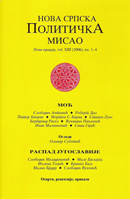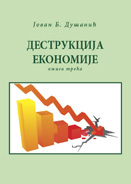| NSPM in English | |||
Crisis over Kosovo |
 |
 |
 |
| субота, 21. фебруар 2009. | |
|
(Guardian, Tuesday 17 February 2009)
The EU continues to be beset by a lack of consensus over Kosovo, with Spain, Slovakia, Greece, Romania and Cyprus – each deeply aware of their own respective internal national self-determination quandaries – firmly withholding recognition. Though the European parliament recently passed a resolution urging a change of stance, each country quickly reiterated their previously stated opposition. Ignacio De Palacio Espana, Spain's ambassador to Serbia, remarked that, "most UN members do not recognise Kosovo's independence", while Dora Bakoyannis, Greece's foreign minister, reaffirmed how Greece would continue to formulate its foreign policy "based on international law, taking into account its national interests, the region's stability and European values". It is highly unlikely that any of this group of five will retreat from this position any time soon. The basis of Serbia's diplomatic approach towards Kosovo remains the framework of UN security council resolution 1244, which emphasises Serbia's sovereignty over Kosovo, and the UN's neutrality. Future talks over technical matters will focus on implementation of UN secretary-general Ban Ki-moon's six-point plan – which ultimately allowed for the deployment of the long-delayed EU rule of law, or Eulex, mission, but which was rejected by the government in Kosovo – not the Ahtisaari plan, which failed to secure UN security council approval. Furthermore, these discussions will take place between Serbia and UN officials, not between Serbia and the government in Pristina. As Goran Bogdanovic, Serbia's minister for Kosovo, insisted, Serbia will "talk to Pristina only about status". The recent establishment of the KSF, meanwhile, has created a new security dilemma; one that only further antagonises relations between Kosovo Albanians and minority communities. Envisaged by the Ahtisaari plan and trained by Nato, the force will consist of 2,500 active recruits and 800 reservists. Though described by Nato as a "lightly armed formation", initially tasked with dealing with crisis situations, civil protection and de-mining operations, Kosovo's president, Fatmir Sejdiu, has expressed his hopes that it will provide the "foundations of a future army of Kosovo". Claims that the force will take part in international peace-keeping operations only serve to reinforce this concern. In response, Bogdanovic has called for the demilitarisisation of Kosovo as the main precursor to security throughout the region; a view echoed by Serbia's president, Boris Tadic, who described the formation of a KSF as "unacceptable". Kosovo Serbs have protested at the move almost daily, while the Serbian government has vowed to use diplomatic and legal means to block the KSF's formation, claiming that it contravenes UN security council resolution 1244, according to which KFOR is the only permitted armed formation in Kosovo. Simmering inter-ethnic tensions, combined with sporadic outbreaks of violence, in the north of Kosovo, particularly in the divided town of Mitrovica, underscore the extent of the challenges facing the recently deployed Eulex mission; which, along with KFOR, has been accused of not reacting quickly enough to protect Kosovo's Serbs. The international community has an extremely poor record of protecting the rights of non-Albanian communities in Kosovo, as demonstrated by the large number of refugees and internally displaced persons post-1999, rendering proclamations about multi-ethnicity and minority rights protection both hollow and disingenuous. Deepening socio-economic problems, compounded by the global economic crisis, which has also impacted remittances and donor support, threaten to ignite more severe manifestations of this lingering discontent. Serbia's diplomatic course throughout 2009 will focus on deterring future recognitions and encouraging submissions to the ICJ from countries supporting the motion that Kosovo's unilateral declaration of independence was not in line with international law. Though the ICJ's ruling is non-binding, a verdict in Serbia's favour would reignite calls for further talks over Kosovo's status and possible retractions of recognition, particularly by countries such as the Czech Republic, where the issue prompted deep domestic divisions, and Costa Rica, which insists that it will act in accordance with international law. Serbia's foreign policy will, however, become increasingly delicate, and at times contradictory, as its pursuit of EU membership is tested by the EU's definition and interpretation of conditionality relating to "good neighbourly relations". |
Остали чланци у рубрици
- Playing With Fire in Ukraine
- Kosovo as a res extra commercium and the alchemy of colonization
- The Balkans XX years after NATO aggression: the case of the Republic of Srpska – past, present and future
- Из архиве - Remarks Before the Foreign Affairs Committee of the European Parliament
- Dysfunction in the Balkans - Can the Post-Yugoslav Settlement Survive?
- Serbia’s latest would-be savior is a modernizer, a strongman - or both
- Why the Ukraine Crisis Is the West’s Fault
- The Ghosts of World War I Circle over Ukraine
- Nato's action plan in Ukraine is right out of Dr Strangelove
- Why Yanukovych Said No to Europe

.jpg)





















